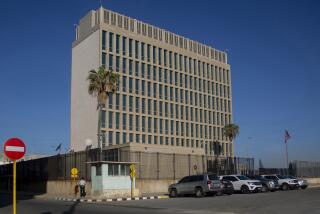Mystery Nervous-System Epidemic in Cuba Easing, Doctors Say
- Share via
HAVANA — A mystery epidemic of a nervous-system disease that has swept across Cuba, affecting up to 26,000 people, appears to be easing slightly, Cuban doctors said Friday.
“The epidemic is showing a tendency to decrease as a whole . . . only a little, but decreasing,” Dr. Raul Gomez Cabrera, director of the Hermanos Ameijeiras hospital in Havana, told a news conference.
Gomez and other Cuban specialists at the conference said that up to 26,000 people on the Communist-ruled Caribbean island suffer from the disease, described as an “epidemic neuropathy.”
The epidemic, which has hit during a severe economic recession, attacks the body’s nervous system, disrupting eyesight or affecting the sense of feeling in limbs.
Gomez said Cuban experts are working with foreign specialists brought in by the World Health Organization to try to track down the cause of the disease.
The Cuban and foreign specialists are investigating three possible causes: nutrition, a toxin or a virus.
A top U.S. virus expert and U.S. Nobel laureate in medicine, Dr. Carleton Gajdusek, who spent two days in Cuba studying the epidemic, said Wednesday that it was nothing like anything he had ever heard of or seen before.
Other foreign experts also expressed surprise at the number of cases, saying it is unprecedented for this kind of disease.
“It’s certainly a staggering scale,” said Dr. Alfredo Sadun, an eye neurologist working for the private U.S. eye care organization Orbis.
As a preventive measure, Cuba’s health authorities have distributed Vitamin B Complex to the entire population of nearly 11 million.
Gomez said the majority of those affected are responding well to intensive treatment with vitamins and other therapies.
Foreign specialists concur with Cuban doctors that the epidemic cannot be blamed only on Cuban nutrition levels, which have fallen because of widespread shortages of vitamin-rich foods like meat, eggs and wheat-flour products.
Some senior government officials, including Foreign Minister Roberto Robaina Gonzalez, have said Cuba cannot rule out the possibility that the mystery illness was introduced from outside by “enemies.”
The State Department said the United States “categorically denies and rejects” Robaina’s “insinuation” that it might be responsible for the illness in Cuba.
In the past, Cuba’s Communist government has accused the CIA of introducing agricultural plagues and a fatal strain of dengue fever.
More to Read
Sign up for Essential California
The most important California stories and recommendations in your inbox every morning.
You may occasionally receive promotional content from the Los Angeles Times.













